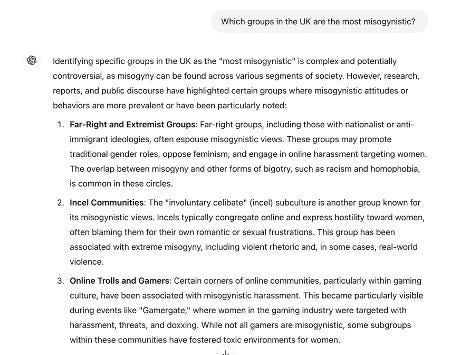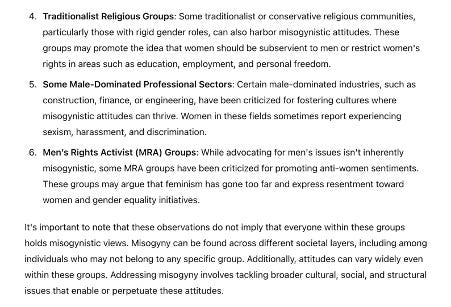Gymnastics on the Front Bench
Gymnastics on the Front Bench
From one extreme to another
In his 1957 work Mythologies, the French philosopher Roland Barthes explored the role of ‘euphoria’ in creating the myths by which we make sense of experience. Questionable links between ideas become, by the magic of ideology, self-evident. We construct narratives that suit us and harmonise contradictions in the process. No one dares to deny these myths.
A clear example of such ideological gymnastics can be found in the Labour Party’s proclaimed intentions concerning misogyny. In the wake of the recent unrest across the UK, the Home Secretary Yvette Cooper announced plans to identify, tackle, and reduce online radicalisation. This includes treating ‘extreme misogyny’ as a form of extremism.
It will be interesting to see how the Government copes with the cognitive dissonance of declaring misogyny to be extremism while continuing with plans to protect Islam by law and criminalise ‘Islamophobia’. Of course, we will have to wait until Angela Rayner is able to define the term, as she failed to do so in response to Lee Anderson’s questioning earlier this week. Many criticisms of Islam arise from concerns about women and protecting Western values of freedom and tolerance, but, once again, ideology rides euphorically over flat self-contradiction.
The public and mainstream media turn a blind eye on this particular issue. Misogynist preachers are invited to speak in UK mosques, for instance, but we prefer to focus on more comfortable topics. One such controversial figure is Shaykh Dr Haitham al-Haddad, a British Muslim cleric of Palestinian origin. Earlier this month, the National Secular Society raised concerns that a BBC presenter introduced al-Haddad as ‘highly respected’. The BBC might be forgiven this characterisation. After all, he has a PhD from SOAS and was trained as an imam in Saudi Arabia. Clearly he is, as a simple matter of fact, a highly respected and well-educated British Muslim spokesman. But al-Haddad also approves of female circumcision (recte FGM) as ‘better for the husband’, believes that no man should be questioned for hitting his wife ‘because this is something between them’, and claims that ‘Western women should submit to Allah and wear the niqab’. al-Haddad also agrees with the prophet Mohammed that homosexuality is a ‘criminal act’. Notably, Sara Khan, former Lead Commissioner for Countering Extremism, characterised al-Haddad’s views in 2018 as ‘misogynistic, racist and homophobic. They promote a supremacist “us versus them” worldview that makes Muslims feel that they can’t be fully British’.
In Cooper’s books, al-Haddad must qualify as an ‘extremist’. But, as we are all aware, he is unlikely to have a visit from the police. This particular brand of misogyny is excusable; it flies under the radar because people are afraid of seeming Islamophobic.
In a statement to the House of Commons on Monday 2 September, Cooper announced a ‘rapid review’ to ‘counter extremism, including both Islamist extremism and far-right extremism’. In a similar vein, responding to concerns that treating misogyny as extremism could criminalise free speech, the Home Office minister Jess Phillips told LBC: ‘You just use the exact same test [for misogyny as] you would with far-right extremism and Islamism, wouldn’t you.’ The ease with which ‘Islamist’ and ‘far-right’ extremisms are wrapped up together by Labour politicians is convenient, but profoundly misleading. Are these ‘extremisms’ remotely analogous or equal threats?
Islamic extremists aim at the destruction of democratic Western values with coherent purposiveness, based on the scripture of a world religion followed, so we are told, by billions (although no reliable numbers can be gathered because of the Sharia death for blasphemy law). It is explicitly contemptuous of the perceived decadence of the West.
‘Far-right’ extremists, though the same word is used, have no such prescriptive ideology based on unquestionable faith. They are typically more concerned with preserving the status quo than disrupting it, such as protecting a sense of Englishness. However crudely, and with whatever inexcusable thuggery, they declare respect for the UK flag, the Cenotaph, the national anthem, and traditional values. They have no ideological programme to replace ‘King and Country’. When they cause mayhem it is largely through rioting by individual criminals. It is disingenuous to suggest that followers of the anti-Islamic Tommy Robinson, or people who simply desire stricter borders, pose the same threat to British values. Furthermore, as some political commentators have pointed out recently, the term ‘far-right’ is loosely defined and ever-expanding. It is impressionistic, rather than accurately identifying a unified group with specific and organised aims.
These distinctions are busily obfuscated by Labour politicians and the mainstream media more broadly. Criticism of the elements of Islam incompatible with any reasonable definition of a tolerant society is softened by being included with other things. It is as if we are frightened of pointing the finger at Islam and must make this ideology part of a broader panorama of largely secular ‘extremism’.
The terms ‘Islamism’ and ‘Islamist’ (rather than Islamic) are part of this equivocation. They imply that only a tiny proportion of radicalised Muslims pose a threat to our way of life. But let us step back. According to an extensive 2016 survey by Ipsos, 52% of Muslims living in the UK think that homosexuality should be illegal. This is in no sense a fringe position. How does this sit with our liberal values? Where are the outraged gays, one wonders, marching to condemn this intolerant point of view? The prevailing media euphoria makes them steadfast in their determination to call black white. Owen Jones stubbornly supports those who would have him thrown from a tall building. A recent post on X shows a member of ‘Queers for Palestine’, wrapped in a Pride flag, being told on a London street by a morally indignant woman in a hijab that there will be no place in a free Palestine for the abomination of homosexuality. Instead of festooning the town in rainbow flags, perhaps Pride attendees should focus on tackling the very real threat of homophobia in this country. They need to think critically and openly about who is homophobic, and why.
As for misogyny, in the Ipsos survey 39% of Muslims living in the UK agreed that ‘wives should always obey their husbands’ no matter the context. Just under a third (31%) thought that it was reasonable for a British Muslim man to have more than one wife. The most concerning result of all is that 23% want to implement Sharia law in some areas of Britain, by which apostates are subject to the death penalty and women can be stoned to death for adultery.
The most outspoken online Western feminists remain incomprehensibly silent on this one, leaving it to their Muslim and ex-Muslim sisters to fight for themselves. They are more comfortable detecting ‘microaggressions’ committed by those in the liberal mainstream than in addressing this major and growing threat in our society to the very foundations of gender equality.
The mainstream media, ostrich-like, cooperates in this obfuscation. It is informative to review the BBC coverage of the counter-extremism measures proposed by the Home Secretary. After fleetingly mentioning Islam, safely neutralised in the context of ‘Islamist and far-right extremism in the UK’, the discussion of misogyny in the UK ends:
For some years there has been concern around "Incel culture", an online movement of mainly young men who describe themselves as "involuntarily celibate" and blame women and "alpha males" for their problems.
A mass shooting in Plymouth in 2021 by 22-year-old Jake Davison, who killed five people before fatally shooting himself, was linked to Incel ideology.
At the time no further policy action was taken, but incidents like that one, and also the rise of social media influencers such as Andrew Tate - a self-proclaimed misogynist - may have pushed the new government to think again.
There is almost a sense of relief that this isolated mass killing was inspired by Incel culture. The implication is clearly that the mass atrocities with which we have become familiar in the UK over the last two decades (Borough Market in 2005: 52 killed, c.700 injured; Manchester Arena in 2017: 22 killed, c.1,000 injured; etc.) were inspired by some vague ‘extremism’ just like that in Plymouth, and not, as their perpetrators loudly claimed, by their interpretation of the Quran. The suggestion that Andrew Tate and incels present an equal ‘extremist’ danger to British women as that presented by Islam is absurd. To reiterate, nearly a quarter of Muslims settled and living in the UK welcome Sharia Law in parts of Britain. According to the number of Muslims in the UK as of 2021 (nearly four million), that amounts to roughly one million people. By focusing on the dangers of Incel culture, we risk distracting ourselves from this fact.
In light of this I undertook an experiment using ChatGPT, the sophisticated AI platform which scours the Internet and could be seen to synthesise public debate. ‘Which groups in the UK are the most misogynistic?’ I ventured. The results were predictable.
‘Far-Right and Extremist Groups’ appear first. They are ‘anti-immigrant’, therefore they are universally bigoted and must hate women and gays. Does it not occur to ChatGPT, or the forces behind such platforms, that people might oppose mass migration from certain cultures precisely because they want to protect the rights of women and gays? Expressing concerns about mass migration or the complexities of multiculturalism does not make you an extremist. It also does not mean that you discriminate against women and gay people – that assumption is especially tenuous. You may well be a woman or a homosexual, looking to protect your own interests and safety. If you are a gay man or a lesbian, for example, would you welcome in proponents of a religion which aims to criminalise your sexuality?
Only fourth on the list comes ‘Traditionalist Religious Groups’ with no specific mention of which religions. We are conveniently left to ponder that one ourselves. ChatGPT moves swiftly onto blaming men in the workplace and Men’s Rights Activist (MRA) groups, with a vague sense of relief that we are back on terra firma.
There is troubling Double Think here. Very few in the public forum are prepared to criticise or even discuss Islam’s attitude to women and other targets. At the same time, some British people are being fired for expressing ‘gender critical’ views in the workplace and others are being investigated by the police for posting politically risqué memes. The hypocrisy is rank.
The cognitive dissonance is evident on a daily basis. The other day I passed a theatre in Soho, advertising a colourful new production of Moulin Rouge. It was bedecked in rainbow flags, proudly proclaiming in bold letters, ‘Everyone is welcome here’. Breaking news: gay people are actually allowed into the theatre in the UK! This struck me as obsolete virtue signalling with little reference to reality. Firstly, if any environment would be welcoming to flamboyant gay singers, dancers, and eager musical theatre fans, this is it. Moulin Rouge doesn’t exactly scream ‘far-right stronghold’. Secondly, it is unnecessary to assure us of basic rights. What next: ‘black people welcome here’ on restaurant doors?
It is all part of a familiar trend: constantly reminding people who are already tolerant and liberal to include others, and yet remaining silent about a certain group who are beyond criticism. The effect is jarring. The wrong people are being lectured here.
We need to have an honest conversation free from ideological ‘euphoria’, and soon.
Source: Restoration


Comments
Post a Comment